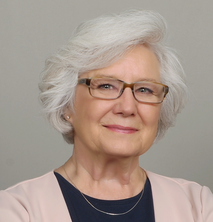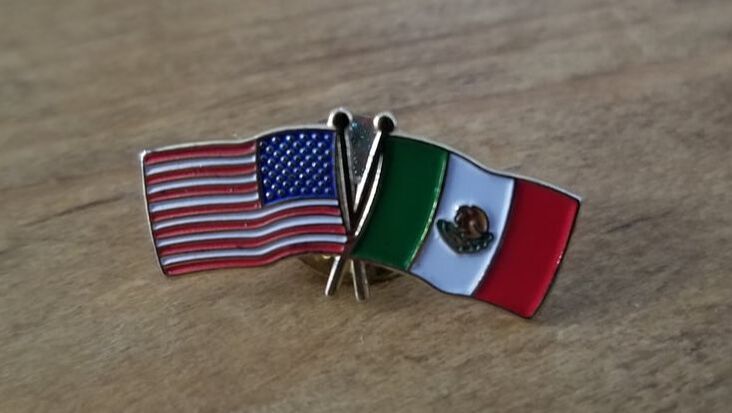|
by Terry Magness  Photo by Rob Laughter on Unsplash Photo by Rob Laughter on Unsplash "Your hair is so pretty," remarked Kaylah, our waitress. The place was packed, and a line of patrons waited, yet this lovely girl with a long chestnut ponytail took a moment to engage with us. "I hope my hair is like yours when I get older." My husband, wanting to get a reaction, pointed to the "snow" on his head and teased, "We both dye our hair this color." "Really?" she asked sincerely. She glanced at me. Seeing my knowing smile and shaking head, she bent over the table. With a sparkle in her eyes, she looked squarely at Don and, as if confronting a child, she asked, "Did you just tell me a lie?" Leaning closer, she warned, "You have to be good for Santa because you can't repent and get forgiveness from him." Straightening up, Kaylah walked around the table, adding, "We are good for Jesus because we love him. We are good for Santa because we want something." We all laughed and agreed she had a good point. But, I was particularly impressed by the boldness and ease with which this young woman, only four years old in the Lord, took—no, made—an opportunity to witness for Christ. I have been in ministry for over forty years, making a decision early on to find open doors for sharing Jesus. It has happened quite naturally at times during conversation. But mostly, I have found it challenging to find an effective way to introduce Jesus without feeling in-your-face obnoxious. It comes easily in church, Bible study, or pastoral counseling, when someone is asking for direction, or with friends. But to approach the man or woman on the street, well, I would just as soon leave that to the evangelists and those "called" to that ministry. Not that I haven't tried. I have gone door-to-door when training how to reach the lost, and also during church Thursday night outreaches. No one was ever rude to me. But I have felt uncomfortable. Why, I wonder? When I commended Kaylah for her boldness, she replied, "Well, if we are ashamed to talk about Him, we are not His.” The Apostle Paul was motivated by a very real and godly love for people. His whole ministry could be summed up in this: he could not bear the thought that anyone would miss eternity with God. Paul was not thinking of himself. He was willing to suffer beatings, imprisonment, torture, humiliation, misunderstanding, ridicule, and to die so that others might enter in. His is a picture of Christ and his heart and sacrifice for the sake of mankind. Is it not written, "Greater love has no man than this, that he lay down his life for his friends." (John 15:13 KJV) Could it be that I am fear driven because I am more concerned about me than I am others? What people will think? What they will do? God reminds us that He "has not given us a spirit of fear, but of power, and love, and a sound mind." (2 Timothy 1:7 NKJV) Lord, I pray you will deliver me from the torment of fear, and perhaps indifference, as I focus upon You this Christmas. You are the author and finisher of my faith. Help me see others through Your eyes. Let my heart beat with Your desires, and may it feel the weight of a soul that may not enter eternity with You unless I do speak. Give me such a passion for the lost, that I would pay any price to give the gift of eternal life.  Terry Magness has been in Christian ministry for forty years, is a licensed minister, author, pastoral counselor to church leaders, missionary, and founder of Grace Harbour Ministries, a Bible based international teaching and discipleship ministry to women. She oversees and teaches needs-based Overcomers classes in her local church, dedicated to helping men and women apply Biblical principles to every life situation. Terry is a lover of people in general, and her family in particular. She enjoys good friends, stimulating conversation, writing, photography, and fishing with her husband, Don.
1 Comment
by Kelly Godzwa Every woman loves finding a good deal, right? Me, too. That’s why I got excited when some of my Mexican friends got to talking about visiting one of the larger ‘tianguis’ (tea-on'-geese) in our city of Mérida. Sounds interesting, right? Picture an enormous flea market with about a hundred different booths covered partially by tarps to keep the sun off the numerous shoppers meandering the narrow makeshift aisles. You can find everything here—from clothing to beauty products, from tropical fish to “fast food,” i.e., homemade quesadillas prepared before your eyes. Despite my many years in Mexico, I had never gone to this particular tianguis opened on Fridays from about 8 AM to 1 PM, which my friends said was similar to the type you’d find in Mexico City. To my surprise, a few of them hadn’t even gone! So, on Friday morning we met at my house and set out together on our adventure. Glad to have found a parking spot about a block away, we entered near the front-middle of the covered park. We shopped together splitting into mini-groups at times, each looking for a bargain on something we needed. I didn’t have anything particular in mind, but near the end of our time, two of us found a booth where a new bundle of clothing had been dumped on a low table for us to rummage through. Jackpot! This mass pile of new American items included shirts, pants, and skirts of various sizes from reputable manufacturers–Talbots, American Eagle, etc. All were priced between 60 and 120 pesos, about $3-$6 USD a piece. With our cell phones, we gave directions to the others to let them know where we were in order to get in on the deals. We were there for at least thirty minutes. While I looked, one friend wandered to the booth across the way and returned with a little trinket. She took a hold of the collar of my shirt and place a pin there. Smiling, she clasped the back to the two linked flags of the US and Mexico. When I saw it, I barely managed to hold back the tears. You see, that small action communicated her acceptance of me despite our different upbringings; it told me that our friendship went beyond borders and was valuable to her. I love that this simple shopping excursion provided the backdrop for her meaningful display of affection! Have you experienced small displays of affection that have had a huge impact on you? This experience makes me aware of how in seemingly small ways I can communicate love through my actions in the day-to-day that may actually speak volumes to another. “Father, make me mindful of ways I can touch others with Your love.” As we finished our shopping, we paid and headed out, happy to have shared this experience, wondering, perhaps, when our next outing together would be. Little did I know as we said our good-byes that my personal tianguis story had yet another chapter. (Check back soon for Part 2.)  Kelly and her husband, Dave, have served as Southern Missouri District missionaries to Mexico since 2006. While one of her ministry roles includes a position as Mexico field treasurer, she also has been active online in the Refresh Connect groups and leadership team. They have 3 teenage children and a mini schnauzer. |
This is a safe place for ministry wives and women ministers to be renewed, resourced, and build relationships with others just like you.
Search Our Blog Archives by Keyword Below
Categories
All
Archives
June 2024
|
Proudly powered by Weebly


